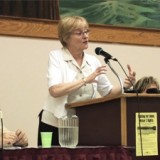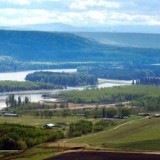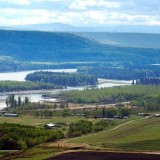Last Friday Gwen
Barlee of the Wilderness Committee and I, on behalf of The
Common
Sense Canadian,
addressed a group of young – at least they look young to me! –
teachers at an ESL college. We were invited because they were hearing
more and more about the BC government’s Energy Policy and they
didn’t like what they were hearing and wanted more information.
On my way home
I started to wonder where my mind was going because I felt a curious
feeling – deep rage combined with every bit as strong a feeling of
sadness. Had I become overwhelmed by the enormity of the ongoing
blatant lie which is the Gordon Campbell dictatorship? Was I getting
like that person we all know, obsessed with something – perhaps a
marriage breakup, maybe a lawsuit – to the point you avoided them?
Crossed the street looking the other way in order to avoid this
tiresome “victim”?
Tonight we’re
having dinner with two old friends who are strong Liberal supporters
– how do I avoid becoming a pain in the ass about what this,
clearly the worst government in BC history, was up to. He is a former
Socred minister, so as we meet, fairly regularly, politics is a
natural discussion – but how can I be part of that discussion when my
rage is white hot and tears only a millimeter away?
I examined my
emotions as I looked again at Dr John Calvert’s piece on the
ridiculously named Clean Energy Bill (elsewhere on this website) a
paper where every sentence makes one angry. Two paragraphs especially
stood out. Here they are:
“To take advantage
of the Government’s politically driven targets for new electricity
supply, private power developers will dam up dozens of additional
rivers all across the province, imposing enormous – and entirely
unnecessary – damage to some of BC’s most precious wilderness
areas. And Hydro will have to build thousands of kilometers of new
transmission lines to service the new power projects, which will do
even more harm to BC’s environment.
The Act is also
designed to promote private sector exports of electricity, exposing
the misleading nature of the Government’s earlier assurances that
its Energy Plans were designed only to meet BC’s domestic energy
requirements. The export agenda will require BC Hydro – and its
ratepayers – to accept the enormous price risks associated with
paying a premium for the developers’ new private power in the hope
that they can recoup this expenditure when selling into the US
market. Contrary to the claims of Minister Lekstrom, this is a recipe
that guarantees private profit by making the public bear the risk.”
There it is – just
what I along with my partner Damien Gillis, along with our colleagues
like Tom Rankin, Joe Foy and Gwen Barlee have been saying for years
now. We are now headlong into a province of private power with rates
set not by what it costs BC Hydro to generate power but what
California, indeed what the market says the price is. And I feel
white-hot rage and bountiful sorrow. For here is the end of W.A.C.
Bennett’s legacy, his dream for BC.
I’m not going to
eulogize Bennett for what he did environmentally in the Kootenays and
Peace River. It was horrendous and along with much of young BC I
raged against it.
But what did he
leave?
We had power, not
clean and green as it was made but clean and green now
because the environment insult was in the past so that now we can
provide clean power at a fraction of the cost on the market.
Why did Bennett do
this?
He perceived power as
a public trust which must be tailored to the needs of British
Columbia. He knew that the private ferry company, Black Ball, would
never take on runs that weren’t profitable and he also knew that
coastal communities would suffer. Realizing that coastal communities
help finance roads and bridges in the Lower Mainland that they would
never use thus the province had an obligation to see that they had
their kind of transportation so he bought Black Ball which became BC
Ferries.
Bennett knew that a
private railway would also never build lines unless they were
profitable, so he took over the old PGE, which became BC Rail.
Bennett knew that we
could have one of the lowest energy costs in the world and that
British Columbians, whether homeowners or industry, ought to benefit
from this. Power became a matter of policy of the government British
Columbians elected and could un-elect.
The Campbell
government has all but destroyed that legacy.
BC Hydro’s
transmission lines have been taken away; BC Hydro is being forced to
buy power from private companies at double or more the export market
value and this on a “take or pay” basis. The annual dividend our
public coffers receive from BC Hydro will be gone, gone south into
the pockets of people like Warren Buffet, leaving us with heavy
operating deficit that drains our public coffers. This all in spite
of the fact that because private companies can’t produce power in
the winter when the water levels are low, BC Hydro (that’s us,
folks) must buy power it can’t use and sell it at a huge loss. If
you need proof of this, ask yourself this question: if private power
will provide power for BC use why do we need Site “C”?
This Energy Policy
has been one long falsehood starting with the ongoing lie that BC is
a net importer of power with Campbell telling us that we must be
energy self-sufficient, which is where private power comes in –
somehow
private power we can’t use will make us self sufficient!
We all expect
governments to gild the lily. We all do that in our private lives but
we don’t expect them to issue one bald-faced lie after another and
build an energy policy on those lies.
I’ve been in
government and while we and the opposition vigorously fought over
policy we both knew that the fight was over ideology or for political
reasons. We might massage the consequences a bit and the opposition
accordingly tell us that we were selling out the province but neither
of us accused the other of lying and keeping the public in the dark.
In those days, we had
a media which examined every jot and tittle of policy and
legislation. Every day we were battered by some of the best
journalists in the country. If our government had proposed to have
and expand fish farms, the outcry of the media would have easily
drowned the rage of the opposition. If we had decided to take local
government’s zoning rights away in order to pay off our dear
contributors we would have been the headline story in the news, both
broadcast and print. That’s the way it was and we in government
hated it – but it made us better governors.
I think my rage and
sorrow have been greatly enhanced because I was a cabinet minister
when our feet were held to the fire on a minute by minute basis by an
alert media whose outlets permitted them to say what they wanted.
Now we have the
so-called “Clean Energy Bill”. (By way of aside, if you hear
government and industry, and the lickspittles like Citizens for Green
Power call themselves “green” and/or “clean” you can be sure
that the very opposite is the case).
Among many things
this Bill will castrate the BC Utilities Commission – the public’s
supposed arm’s length regulator – which had the temerity to render
a report that said that the government’s private power policy was
“not in the public interest”. Under this government, God help an
independent commission that calls it like it is.
Our abandonment of
public power in favour of private companies that produce power when
we don’t need it, thus sell it at a huge loss, will be complete
once this bill is passed. We, the long-suffering public, have a
government that piles one lie upon another, a media which is little
more than government shills, and an opposition quite unworthy of the
name.
This means we must do
it ourselves. We must educate ourselves and write the premier and his
MLAs; We must do as Bill Vander Zalm and Chris Delaney are doing with
the HST; and, forgive the vanity support organizations like The
Common Sense Canadian.
How can this be done?
The famous American
lawyer, Clarence Darrow was asked “how can I ever thank you” and
he replied, “Madam, ever since the Phoenicians invented money
there’s been only one answer to that question.”
We can make the
bastards behave if we write, chant, march and support all who are
fighting full time.
This
must be done if we’re going to leave our province intact for the
young and those to come.




